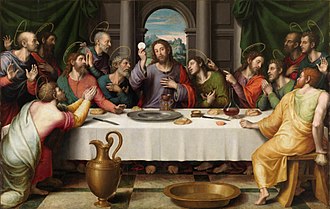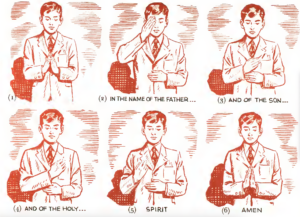
There is a serious claim from our protestant brethren that drinking Christ’s blood is a unbiblical because Leviticus says, “If any man whosoever of the house of Israel, and of the strangers that sojourn among them, eat blood, I will set my face against his soul, and will cut him off from among his people:” ¹. However, there are a few issues with applying this verse to the Eucharist.
What did Christ do concerning the Old Covenant? As Christ says “Do not think that I am come to destroy the law, or the prophets. I am not coming to destroy but to fulfill.” ². Levitical law was meant as the law for the Jews and contains three types of laws. civil, ceremonial, and natural. What Jesus is claiming here is that he is fulfilling the law and thus in a sense doing away with the entity (The tribes of Israel) who was bound to all three. As Christians, we are no longer bound to the civil or ceremonial law of the Israelites but still bound to natural law.
Natural law is the framework through which we view all issues of morality. As Christians, the natural law contains two main criteria. Love God above all else and love your neighbor as you love yourself.
When we look at whether Leviticus 17:10 is binding there are two questions. What is the purpose, does it go against human dignity, and does it go against God?
Firstly, what is the purpose of the law? Often when you question the purpose of a verse a good rule of thumb is to review a few verses before and after. Well in the very next verse, it reads “Because the life of the flesh is in the blood: and I have given it to you, that you may make an atonement with it upon the altar for your souls, and the blood may be for an expiation of the soul.” ³. From this we can glean that the purpose of this prohibition was that the blood was to be used in the rituals for the forgiveness of sins. However, with the death and resurrection of Christ, we no longer need blood sacrifice. Christ has paid the ultimate price so our sins may be forgiven without such a sacrifice. Secondly, does it go against human dignity? The answer is no. The Catechism of the Catholic Church states “The dignity of the human person is rooted in his creation in the image and likeness of God“⁴. In no way does accepting the Eucharist infringe on this statement.
Thirdly, is it against God? Again no. Christ tells us “He that eateth my flesh, and drinketh my blood, hath everlasting life: and I will raise him in the last day “⁵. We are not going against God by receiving the Eucharist. We are doing what he has told us to do. “Amen, amen I say unto you: Except you eat the flesh of the Son of man, and drink his blood, you shall not have life in you.” ⁶.
So, no. Drinking the blood of Christ in the Eucharist is not a sin. Leviticus 17:10 was a law put in place by God for the Israelites to serve a ritualistic purpose which because of Christ’s death and resurrection is no longer necessary for the forgiveness of sins.
¹Leviticus 17:10
²Matthew 5:17
³Leviticus 17:11
⁴CCC 1700
⁵John 6:55
⁶John 6:54

 First Sorrow: Mary Hears the prophecy of Simeon in the Temple
First Sorrow: Mary Hears the prophecy of Simeon in the Temple Second Sorrow: Mary flees with Joseph into Egypt to save Jesus
Second Sorrow: Mary flees with Joseph into Egypt to save Jesus Third Sorrow: Mary loses Jesus and finds Him again in the Temple
Third Sorrow: Mary loses Jesus and finds Him again in the Temple Fourth Sorrow: Mary meets Jesus carrying the cross on the way to Calvary
Fourth Sorrow: Mary meets Jesus carrying the cross on the way to Calvary Fifth Sorrow: Mary is present at the Crucifixion and Death of Jesus
Fifth Sorrow: Mary is present at the Crucifixion and Death of Jesus Sixth Sorrow: Mary receives the dead body of Jesus in her arms
Sixth Sorrow: Mary receives the dead body of Jesus in her arms Seventh Sorrow: Mary accompanies Jesus to His Burial
Seventh Sorrow: Mary accompanies Jesus to His Burial
Hey, pg99casino is definitely worth a shot if you’re into online casinos. The layout’s decent and they have a fair selection of games. Check it out and see what you think: pg99casino
1xbetkorea seems super popular here. Checked it out and the odds are pretty competitive. Good for those who understand Korean well or use translation. Link here: 1xbetkorea
Yo, 68win29 is the real deal! Been hitting some sweet wins lately. Def worth checking out 68win29.
I’ve been exploring ninogaming lately and wow so far, so good The interface is clean and the games are smooth Totally recommend it ninogaming